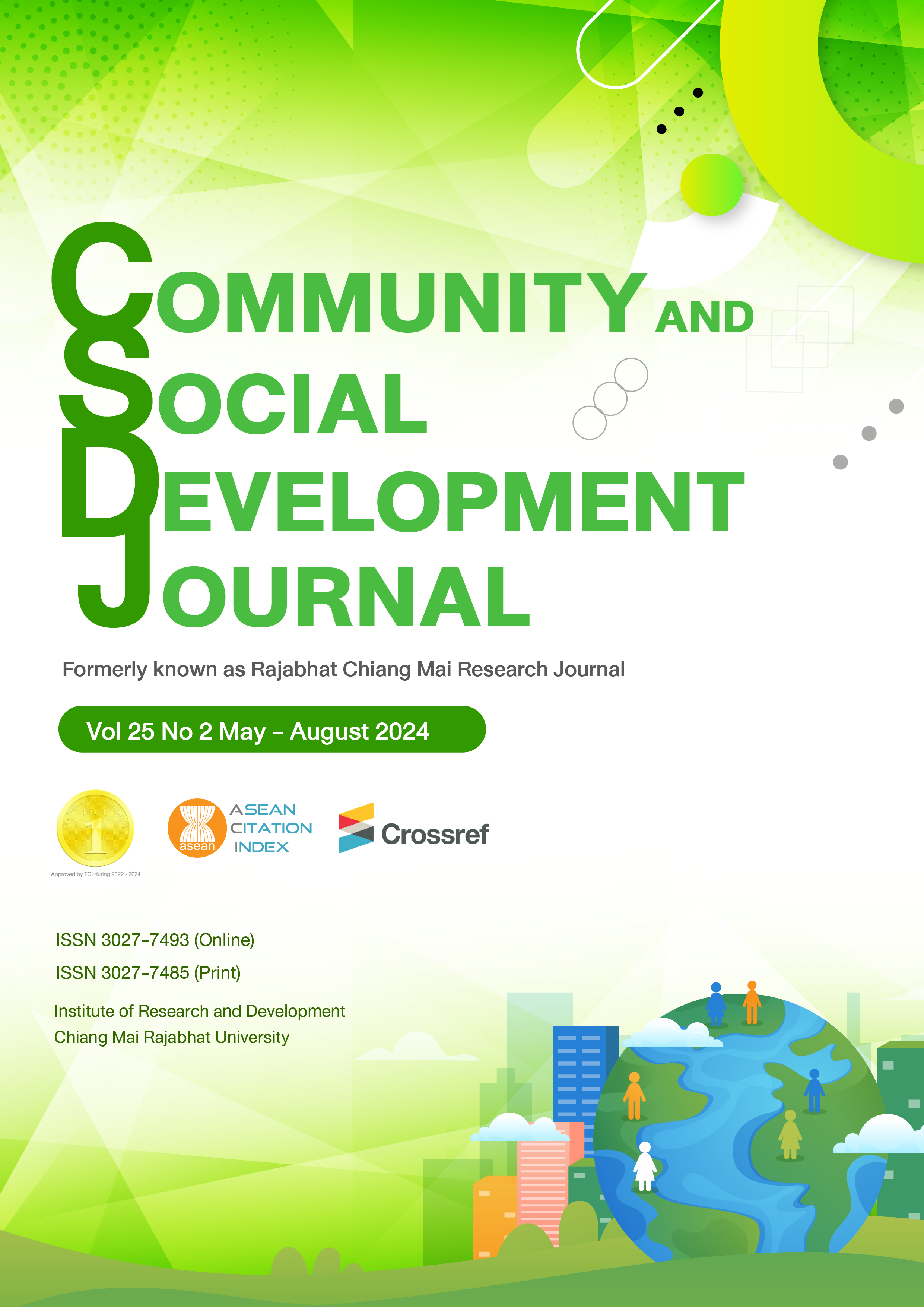The Development of the Phenomena- based Learning Model Accompanied by STEM for Enhancing Students' Competency in Science Learning Management
DOI:
https://doi.org/10.57260/csdj.2024.268387คำสำคัญ:
Phenomena as a base, STEM learning management, Learning management science, Student teaching practiceบทคัดย่อ
The objective of this research is; 1)to study basic information in developing learning management model using phenomena as a base in conjunction with STEM learning management to enhance learning management science competencies for the student teaching practice, 2)to create and examine the quality of a learning management model using phenomena as a basis in conjunction with STEM learning management, in order to strengthen learning management science competencies for the student teaching practice, 3) to study the results of an experiment using a phenomenon-based learning management model in conjunction with STEM learning management, in order to strengthen learning management science competencies for the student teaching practice. A research and development process, the research methodology consists of the following 3 research steps; 1) research fundamental data for creating a learning management system, 2) create a learning management system and evaluate its effectiveness, 3) use the learning management approach to analyze the experiment's findings. The sample group is the student teaching practice in year 3, Faculty of Education, Phetchabun Rajabhat University, academic year 2023, totaling 25 people, this is obtained using a lottery approach of simple random drawing. The research instruments include a knowledge exam, a test of critical thinking on learning management design, and a test of drafting a learning management plan, and data analysis using t-statistics.
The results of the study found that; 1) The generation of learning management plans, student analyses, and curriculum analyses were deemed to be very acceptable based on the findings of the study of foundational data used to build the learning management model, 2) the results of creating and assessing the five components of the learning management system for quality; 1.1) principle 1.2) objective 1.3) learning content 1.4) learning activities and 1.5) measuring and evaluating learning outcomes, the five phases for planning educational activities are as follows; explore, engage, engineer, plan, and evaluation, 3) utilizing the learning management paradigm, the experiment's outcomes revealed that; 3.1) with a statistical significance of.05, the student teaching practice has a greater understanding of learning management science than they had before to their studies, 3.2) with statistical significance at the .05 level, the post-study learning design thinking capacity of the student teaching practice is higher than the 80% limit, and 3.3) if student involvement above the limit of 80%, the student teaching practice may generate learning management plans after class, with statistical significance at the .05 level.
Downloads
เอกสารอ้างอิง
Butkatanyu, O. (2018). Phenomenon-based learning for holistic perspective building and learners' access to the real world. Journal of Education Chulalongkorn University, 5(4), 348-365. Retrieved from https://so02.tci-thaijo.org/index.php/EDUCU/article/view/131909
Daehler, K., & Folsom, J. (2016). Making Sense of SCIENCE: Phenomena-Based Learning. Amazon.com: Making Sense of SCIENCE: Matter for Teachers of Grades 6-8, Teacher Book: 9781938287015.
Dhedchawanagon, K. (2023). Development of Bilingual Teaching Models According to Multicultural Education Approaches Using English and Ethnicity Language. Rajabhat Chiang Mai Research Journal, 24(2), 32-55. Retrieved from https://so05.tci-thaijo.org/index.php/cmruresearch/article/view/263046
Finnish National Board of Education. (2016). National Core Curriculum for Basic Education 2014. Helsinki, Finland: Finnish National Board of Education.
Institute for the Promotion of Teaching Science and Technology. (2014). Basic knowledge of STEM. Bangkok: Institute for the Promotion of Teaching Science and Technology. Ministry of Education.
Kaewthep, K. (2015). Community development working tools. Bangkok: Catholic Council of Thailand for development.
Kanchanawasi, S., Pittayanon, T., & Srisukho, D. (2004). Selecting appropriate statistics for research. (4th ed.). Chulalongkorn University Press.
Karimah, L & Kasetchai, L. (2016). Results of developing a 7-step learning cycle plan (7 Es) in Mathematics on the topic of adding and subtracting numbers with results and factors not exceeding 20 students. Grade 1, Municipal School 1(Eng Siang Samakkhi). Journal of Education Prince of Songkla University Pattani Campus, 27(3), 78-92. Retrieved from https://so02.tci-thaijo.org/index.php/edupsu/index
Mahawijit, P. (2019). Application of the concept of phenomenon-based learning with active learning in primary school subjects to enhance learning skills in the 21st century. Journal of Educational Science Khon Kaen University, 42(2), 73-90. Retrieved from https://so02.tci-thaijo.org/index.php/EDKKUJ/article/view/195627
Mattila, P., & Silander, P. (2015). How to create the school of the future: revolutionary thinking and design from Finland. Finland: Multprint, Oulu.
Nuankham, C. (2019). Effect of using social media activities package based on phenomenon-based learning and reflective thinking on digital literacy behavior for primary school students. (Theses and Dissertations, Chulalongkorn University).
Office of the Teachers Council Secretariat. (2013). Announcement of the Teachers Council Committee regarding knowledge, competency and professional experience of teaching professionals, educational institution administrators, educational administrators, and educational supervisors. Ministry of Education.
Office of the National Economic and Social Development Board. (2008). Learn the principles of His Majesty's work. Bangkok: 21st Century Company Limited.
Phodong, A. (2017). Developing a self-directed learning model to strengthen the learning design ability of student teachers Rajabhat University. (Doctor of Education Degree, Program Curriculum and teaching field, Graduate School Naresuan University).
Samahito, C. (2019). Organizing phenomenon-based learning experiences for early childhood children. Silpakorn University Journal, 39(1), 113-129. Retrieved from https://so05.tci-thaijo.org/index.php/sujthai/article/view/133479
Valanne, E. A., Dhaheri, R. M. A., Kylmalahti, R., Sandholm-Rangell, H. (2017). Phenomenon Based Learning Implemented in Abu Dhabi School Model. International Journal of Humanities and Social Sciences, (3), 1-17. Retrieved from https://ijhss.net/index.php/ijhss/article/view/263
Wettong, S. (2018). Developing a brain-based teaching model to promote Thai reading and spelling skills for primary school students 1. Education Journal Prince of Songkla University Pattani Campus, 29(3), 66-78. Retrieved from https://so02.tci-thaijo.org/index.php/edupsu/article/view/180751
Wongratana, C. (2007). Techniques for using statistics for research. Nonthaburi: Thai Neramitkit Inter Progressive.
ดาวน์โหลด
เผยแพร่แล้ว
รูปแบบการอ้างอิง
ฉบับ
ประเภทบทความ
สัญญาอนุญาต
ลิขสิทธิ์ (c) 2024 Community and Social Development Journal

อนุญาตภายใต้เงื่อนไข Creative Commons Attribution-NonCommercial-NoDerivatives 4.0 International License.
1. บทความ ข้อมูล เนื้อหา รูปภาพ ฯลฯ ที่ได้รับการตีพิมพ์ใน “Community and Social Development Journal” ถือเป็นลิขสิทธิ์ของ Community and Social Development Journal มหาวิทยาลัยราชภัฏเชียงใหม่ และเพื่อให้เผยแพร่บทความได้อย่างเหมาะสมผ่านสื่อสิ่งพิมพ์และอิเล็กทรอนิกส์ ผู้เขียนยังคงถือครองลิขสิทธิ์บทความที่ตีพิมพ์ภายใต้ใบอนุญาต Creative Commons Attribution (CC BY) ซึ่งอนุญาตให้เผยแพร่บทความซ้ำในแหล่งอื่นได้ โดยอ้างอิงต้องอ้งอิงบทความในวารสาร ผู้เขียนต้องรับผิดชอบในการขออนุญาตผลิตซ้ำเนื้อหาที่มีลิขสิทธิ์จากแหล่งอื่น
2. เนื้อหาบทความที่ปรากฏในวารสารเป็นความรับผิดชอบของผู้เขียนบทความโดยตรง ซึ่งกองบรรณาธิการวารสารไม่จำเป็นต้องเห็นด้วยหรือร่วมรับผิดชอบใดๆ














